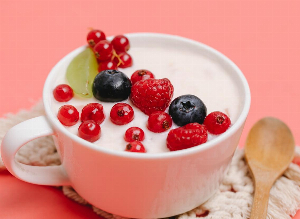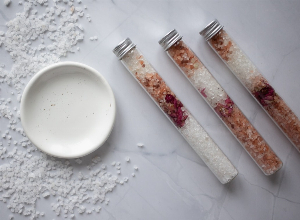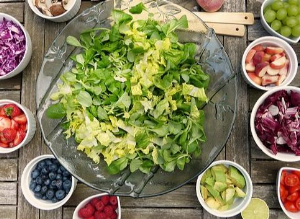Prebiotics and Probiotics: What is the difference and how can they impact your health?
Published May 24, 2021 • By Courtney Johnson
Both prebiotics and probiotics have been among the top buzzwords in nutrition in recent years. Though the two sound similar, they actually have two different roles in our health.
What are prebiotics and probiotics? How are they different? What role do they play in our health?
We explain it all below!

The gut microbiome explained
Before we dive into pre- and probiotics, it’s important to understand one crucial aspect of the human body: the gut.
While we often picture bacteria as tiny, invisible organisms that make us sick, they actually play an important role in keeping us in good health.
The gut bacteria (called gut flora or gut microbiota) are crucial to our digestive health; they help to break down and digest food, communicate with the immune system, and stave off inflammation. Having good bacteria in the digestive tract helps to protect us from harmful bacteria and fungi.
Probiotics and prebiotics help support this friendly bacteria in our intestines, but in separate ways.
What are prebiotics and what do they do?
Prebiotics are compounds (typically foods that are high in fiber) that serve as a food source for the friendly bacteria in the digestive tract. Our body cannot break down these foods, so they remain mostly intact until they reach the colon, where they gut flora are able to break them down into the nutrients that help them to thrive and grow.
Prebiotics are present in fiber-rich foods that often contain complex carbohydrates, including bananas, asparagus, leeks, onions, garlic, barley, oats, dandelion greens, and apples. They can also be taken as a dietary supplement and are often sold in pill form.
Health benefits of prebiotics
Prebiotics are highly beneficial to the body, as they support the growth of health-benefiting bacteria and boost their activity.
Less research has been done on prebiotics than on probiotics, but some research has suggested that prebiotics help to improve calcium absorption, speed up the processing of carbohydrates, and aid in the growth of good gut bacteria which potentially enhance digestion and metabolism.
When and how to take prebiotics?
According to health specialists at the University of California San Francisco, most Americans don’t consume the daily recommended amount of fiber, only taking in around half of the recommended dose.
By not getting enough fiber through plant-based foods, we deprive the gut microbiota of its fuel through prebiotics.
The simple fix for this problem is to eat more prebiotic foods - both the USDA and the World Health Organization recommend consuming 25-30 grams per day. One of the best sources of prebiotics are plants, because they also serve up important nutrients like vitamins and minerals, as well as phytochemicals such as antioxidant polyphenols.
What are probiotics and what do they do?
Probiotics, on the other hand, are live microorganisms, usually specific strains of bacteria, which add to the population of healthy bacteria in the gut. Like prebiotics, they can be taken in through food or as a supplement.
Probiotics are present in many fermented foods, such as yogurt, sauerkraut (fermented cabbage), kombucha (a fermented tea), and tempeh (fermented soybeans).
Health benefits of probiotics
Probiotics are highly beneficial to human health because they break down food and support the immune system, but as recent research has shown, their benefits are not just limited to the digestive system.
Extensive research has been done on the benefits of probiotics and has found that they may assist in the treatment and prevention of:
- Diarrhea
- Irritable bowel syndrome (IBS)
- Crohn's disease
- Ulcerative colitis
- H. pylori (a bacteria which causes ulcers)
- Vaginal infections
- Urinary tract infections*
- Digestive tract infections caused by Clostridium difficile (C. diff)
- Eczema in children
Doctors often prescribe probiotics to accompany a prescription of antibiotics, because they can diminish the side effects as the antibiotics’ disrupt the microbiota, notably diarrhea.
Studies have shown that probiotics may have cancer-fighting properties, particularly when faced with colon cancer. Scientists have found evidence that a few strains of Bifidobacteria and Lactobacillus can prevent the growth of bacteria that produce enzymes that play a role in cancer development.
A new field of research has been created, called psychobiotics, which examines the effects of gut bacteria on the brain. Some evidence has suggested that certain metabolites emitted by probiotic organisms can impact the brain’s health, its ability to manage stress, and even certain symptoms of depression.
>> Learn more about the gut-brain connection here <<
When and how to take probiotics?
Like with prebiotics, an easy way to consume more probiotics is to add more fermented foods to your diet.
There is no recommended daily intake for probiotics, so guidelines on how much fermented food to consume may vary. An important point to remember when purchasing fermented foods is to make sure that they are not pasteurized, as the pasteurization process kills bacteria, good or bad.
Some foods can also be considered synbiotic, meaning that they contain both probiotics and prebiotic fiber for the bacteria to feed upon. A few examples of synbiotic foods are sauerkraut, cheese, and kefir (a fermented milk drink).
The takeaway
Both pre- and probiotics are key for not only our digestive health, but our overall health. Prebiotics serve as a source of fuel for probiotic bacteria, which act on different areas and processes of the body and help us to stay in good health.
If you’re interested in incorporating more pre- or probiotics into your diet, don’t hesitate to consult with your doctor or a nutritionist, who can point you in the right direction on which foods or supplements are best for you.
Was this article helpful to you?
Share your thoughts and questions with the community in the comments below!
Take care!
Sources:
- Dwivedi, Sangam, et al. “Plant Prebiotics and Human Health: Biotechnology to Breed Prebiotic-Rich Nutritious Food Crops.” Electronic Journal of Biotechnology, Elsevier, 31 July 2014, www.sciencedirect.com/science/article/pii/S0717345814000748.
- Prebiotics, probiotics and your health, Mayo Clinic
- Prebiotics vs. Probiotics: What’s the Difference?, Cleveland Clinic
- Probiotics and Prebiotics: What’s the Difference?, Healthline
- What is the difference between prebiotics and probiotics, MedicalNewsToday
- What are Pre And Probiotics And How Do They Work?, Atlas Biomed
- The 19 Best Prebiotic Foods You Should Eat, Healthline
- Increasing Fiber Intake, UCSF Health
- Health benefits of taking probiotics, Harvard Health
Comments
You will also like

Spoon theory: What is it and how can it help people living with chronic illness?
Apr 13, 2022 • 7 comments

 Facebook
Facebook Twitter
Twitter

